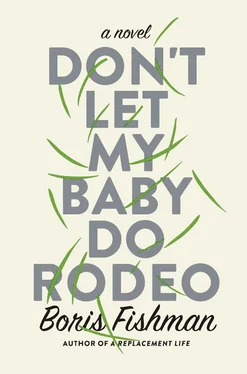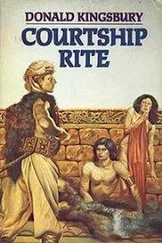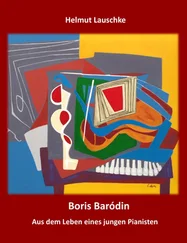+
After their son vanished upstairs, Eugene and Raisa sat noiselessly at the dining room table. It was late, and they felt old. Eventually, Eugene, feeling the male’s responsibility to act, stirred and gently took his wife by the soft meat under her elbow.
“Zhenya, I want to look at him one more time,” Raisa said. Eugene shrugged to say of course — how could he refuse his wife. He cherished moments like these, which usually arrived as soon as his daughter-in-law — or his son; true, his son, too — left the room. Suddenly, the proper course of action was unmuddled, the language of the room clear and direct.
They climbed the stairs, Max’s door opening for the third time since he had fallen asleep. He was wheezing softly. With satisfaction, Raisa noted that the boy remained where she’d left him. Then she remembered everything else and reclined her head against Eugene’s shoulder, rolling it back and forth in dismay.
“Did you think, when you said you’d go ice-skating with me fifty years ago,” Eugene said, “that we would be standing in America looking at our blond grandson after he spent the afternoon dunking himself in a river like a beaver?”
“I’m frightened, Eugene.”
He touched her shoulder quietingly and strode into the bedroom. “Eugene!” Raisa hissed. “Let him be.”
“I’m awake,” Max said.
“He’s awake,” Eugene forgave himself, but in a whisper, because if Alex heard, Eugene would get an earful. “I want to talk to my grandson. When can I talk to my grandson without everyone else interrupting?”
Raisa threw her hands at the ceiling: “Should I leave you two alone?”
Eugene studied his wife’s silhouette in the doorway. He perceived just how much Raisa had to restrain herself so as not to antagonize their son and his wife. He wished to give her some great freedom. In seventy years, had she not earned at least that? He said to her, mocking the sudden sincerity but also sincere: “I am no one without you.”
Max watched them solemnly.
“What are you staring at, Columbus?” Eugene turned back to his grandson and lowered himself to the bed. A knee cracked, and Eugene wailed comically. He tickled Max’s belly through the blanket. “How long are you going to sleep in pajamas, heh? Are you a grown-up or what? Grown-ups sleep in briefs and nothing else. Grown-ups make the room cold, so their lungs get bigger in the night. Do you understand? Who’s going to have the biggest lungs in the world?”
“Me,” Max obeyed.
“That’s right. Now let’s talk business.” Eugene reached into the back pocket of his slacks and pulled out his wallet. “This, by the way,” he said, pulling out a square photo with foxed edges, “is your grandmother fifty years ago. Heh? Look at that.”
Max sat up and ran his fingers over the photo’s ancient matting.
“She was the most beautiful girl in the world,” Eugene said. He looked at the doorway. “And still is.” Letting Max hold on to the photo, he reached back into the billfold and withdrew twenty dollars. “Now listen. Every week you don’t do what you did today, you get one of these. You follow? You go back to sleeping in your bed and you stay there, you get two of these. Shake with me, because once you’ve shaken, it’s a shame to go back on it. Give it here.” Eugene stuck out a paw. Max placed his hand inside it.
“Do I need to teach you how to shake?” Eugene said.
“Eugene, leave him be,” Raisa pleaded from the door.
“Woman, don’t interrupt,” Eugene said playfully. Max dropped his hand, giving up.
“Come on!” his grandfather badgered him, but then let it go, shaking his head. He reached under Max’s bed and pulled out the board with the pouches of grass. He opened the one in the upper-left-hand corner and clawed out the wisps of dried grass. Raisa approached and took them from his hand as Max watched apprehensively. Eugene rolled up the twenty and stuffed it into the pouch.
“Until every one of these is filled with a twenty, you can’t touch the money, okay?” he said. “I see the money gone, I see the grass back, it’s all over. You forfeit all the money, lose the game. Does a Rubin lose?”
“No,” Max said.
“The only person I lose to is you,” Eugene said. “Do we have a deal?”
“I am about to pull you away from him by the ears,” Raisa complained.
“My commanding officer has ordered me to retreat,” Eugene said to Max. “Okay?”
“Okay,” Max said softly. He watched his grandparents go.
+
With no Rubins left to interfere with his sleep, Max sped down a creek astride a muskellunge pike, its scales sparkling under the water. Maneuvering around deadwood and stones, the fish split the creek with the speed of an arrow, the black buttons of its eyes occasionally sweeping up toward the riders. The other passenger was the odd boy from the house — he had circled his arms around Max’s waist and dropped his head against Max’s shoulder. He was burbling something— bah, bah, bah —but didn’t seem to be afraid.
They moved quickly, passing bridges, silent woods, other homes, though each one looked like the white farmhouse from where Max’s parents were called, set back from the road by two or three hundred feet. Children waved at them from the bridges, drivers peeked out of their windows. They had an escort of turkey vultures, circling overhead. Max’s feet were pegged to the pike’s flank, and it nosed through the water so neatly that only the rare drop reached his face, a cold pinprick of wet.
Bah-bah-bah . Max turned around and said to hold on, it wouldn’t be long now. He knew the place was coming, but when this stand of poplars ended, another began, and then a farmhouse, a swamp, a row of marshy fields, a thicket of electrical lines. It wouldn’t come.
But then it did come. Max didn’t have to tell the pike to slow down; it stopped and idled in place. To the unaided eye, there was little about this clearing to mark it apart from the many they’d passed, a plain field surrounded by hundred-foot trees, so tall they seemed to be talking about something up at the crowns. The roots were so thick the crowns didn’t sway even when the wind gusted. Here and there wildflowers grew, winks of violet, yellow, and rose.
Max turned as far as he could inside the boy’s hold. Then he put his own arms around him, and they held each other briefly. Then the boy, also knowing the moves, slid off Max, and plopped into the water. He stood up, drenched, and smiled an embarrassed, toothy smile, his eyes rolling back in their sockets. Max nodded. The boy turned away and slopped to the shore. Max called out that he would be back with the others. “Just remember, I have to take you back before morning.” The boy turned around and spoke as if no impediment addled his mind: “I’ll wait for you here.”
Alex and his parents had wanted children and grandchildren with the same mindless hunger with which they sat down to meals. None had prepared for the possibility that this may not be biologically possible. They believed that America was at fault; it wouldn’t have happened like this back home. There — maybe it was the food, which had no preservatives; maybe the slow pace and absence of stress — everyone was fertile. America regarded adoption as a normal course, so American bodies adjusted to fit the culture’s endorsement. This country all but authorized its citizens to go barren.
The Rubins’ desire to become parents and grandparents was eclipsed only by their conviction that adopted children were second-class, by definition unwanted; and why would a child be unwanted? Because something was wrong. Maya was repelled by adoption no less than the Rubins; imagining it was like imagining marriage to someone one hoped one would figure out how to love. As Maya greeted the dubious outcomes married life had harbored for her — medical work, after all; all the ways in which the elder Rubins did not resemble her parents — childlessness had not even occurred to her, perhaps because she held to the same expectations about Russian fertility. She didn’t know any infertile Russian couples. She knew very few people, Russian or otherwise, outside the Rubins, but the Russians among them were all fertile. Even Bender, the pulped, gray-faced psychologist in Whippany, and his snow-haired wife had a small Bender knocking around some college.
Читать дальше












